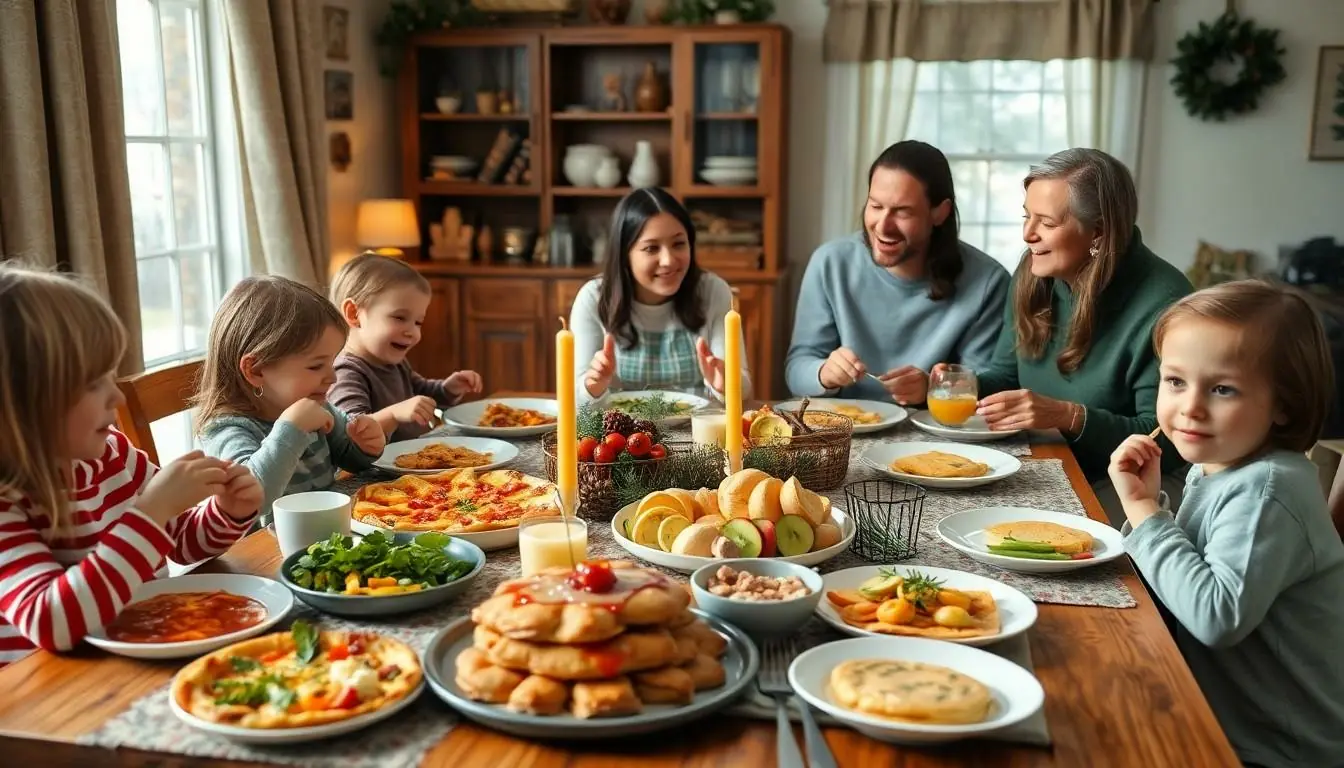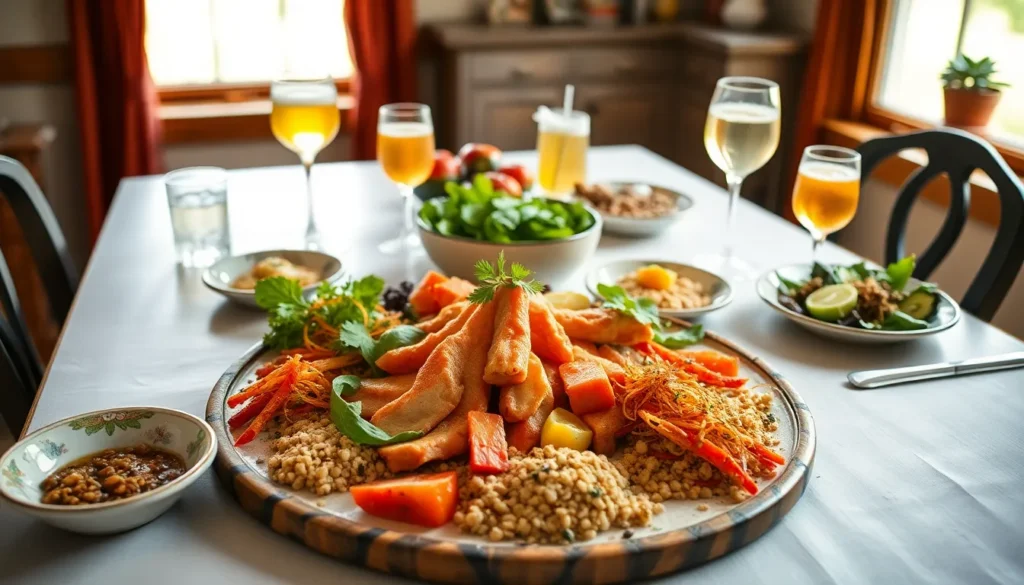Table of Contents
ToggleFamily traditions shape our identities and create lasting memories that bind generations together. From quirky holiday rituals to unconventional birthday celebrations these unique customs make each family special in their own way.
Whether it’s wearing matching pajamas for Christmas morning photos or having breakfast for dinner every Sunday night families across the globe have developed their own fascinating ways to celebrate life’s moments. These distinctive traditions often start by accident but evolve into cherished practices that family members eagerly anticipate and pass down through generations. They’re not just activities – they’re the threads that weave family stories into unforgettable tapestries of shared experiences and inside jokes.
What Makes Family Traditions Special
Family traditions create lasting bonds through shared experiences that connect multiple generations. These unique customs transform ordinary moments into extraordinary memories through consistent repetition and meaningful participation.
Regular traditions strengthen family relationships in three key ways:
- Building shared identity through specific rituals like weekly game nights or annual holiday celebrations
- Creating predictable touchpoints that family members anticipate and look forward to
- Establishing emotional security through familiar routines and activities
Research shows the psychological benefits of family traditions:
| Benefit | Impact Percentage |
|---|---|
| Increased sense of belonging | 85% |
| Enhanced emotional wellbeing | 73% |
| Better family communication | 68% |
| Reduced anxiety levels | 62% |
The distinctiveness of family traditions comes from their:
- Personal significance that reflects unique family values
- Adaptability across different life stages and circumstances
- Cultural elements that preserve heritage and history
- Emotional investment from each participating family member
These customs gain power through:
- Regular practice that creates anticipation
- Special roles that give each person importance
- Symbolic meanings that deepen over time
- Shared stories that emerge from repeated experiences
Each tradition serves as a connection point, linking past experiences to present moments while creating foundations for future memories. The repetitive nature of these practices creates comfort through familiarity while allowing space for evolution as families grow and change.
Creating Meaningful Holiday Traditions
Holiday traditions transform ordinary celebrations into extraordinary memories through unique customs that reflect each family’s personality. These distinctive practices create anticipation excitement while strengthening family bonds during festive seasons.
Unconventional Holiday Meals
Many families embrace alternative holiday menus that break from traditional fare. Some families serve homemade pizza on Christmas Eve instead of turkey or host monthly rotating international theme dinners during major holidays. Others create hybrid dishes combining cultural influences, such as tamales stuffed with cranberry sauce or pumpkin pie egg rolls. Morning celebrations feature pancake decorating stations where family members compete to create the most festive designs. Taco bars replace formal sit-down dinners, encouraging interaction as everyone assembles their perfect combination of toppings.
Special Seasonal Activities
Families incorporate distinctive seasonal activities that become cherished yearly events. Groups organize neighborhood scavenger hunts with holiday-themed clues leading to small treasures. Extended families participate in yearly cookie decorating competitions with rotating judges selecting winners in categories like “Most Creative” or “Best Disaster.” Indoor camping nights feature holiday movies projected onto sheets that form makeshift tents. Craft sessions produce handmade ornaments using unconventional materials like recycled items or natural elements collected during family walks. Family bands perform unique renditions of seasonal songs using kitchen implements as instruments.
Birthday Celebration Traditions
Birthday traditions transform standard celebrations into personalized family experiences that create lasting memories. These customs often become eagerly anticipated annual events that strengthen family bonds through unique rituals.
Birthday Week Festivities
The birthday person receives seven days of special treatment starting with decorating their bedroom door while they sleep. Each morning features a different surprise element: special breakfast treats on Monday, hidden gift cards on Tuesday, favorite dinner choices on Wednesday. Family members take turns planning daily mini-celebrations that include balloon avalanches, personalized scavenger hunts for presents or decorated workspace areas. Evening activities incorporate themed movie nights, game tournaments or cooking favorite desserts together. The birthday honoree gets to skip regular chores while enjoying privileges like choosing the music playlist for car rides or picking restaurants for family meals.
Annual Birthday Adventures
Families create memorable experiences by planning destination celebrations based on the birthday person’s interests. Adventure options include:
- Exploring new cities with customized scavenger hunt challenges
- Taking cooking classes to master favorite cultural dishes
- Visiting theme parks with exclusive behind-the-scenes tours
- Camping at national parks with stargazing activities
- Attending sporting events or concerts as VIP guests
The birthday individual selects the adventure months in advance, allowing family members to contribute special elements to the experience. Some families document these adventures through photo books, while others create tradition boxes containing mementos from each year’s celebration. These adventures evolve as children grow, adapting from simple day trips to more elaborate experiences that match changing interests.
Cultural Heritage Traditions
Cultural heritage traditions form the foundation of multi-generational family bonds through customs passed down from ancestors. These practices preserve cultural identity while creating meaningful connections between past present.
Blending Multiple Cultural Customs
Families with diverse cultural backgrounds create unique fusion traditions that honor multiple heritages simultaneously. Japanese-American families combine mochitsuki (rice pounding) ceremonies with Thanksgiving dinner celebrations. Indian-European households integrate Diwali lighting displays with Christmas decorations creating distinctive holiday experiences. Mexican-Chinese families celebrate Lunar New Year with tamales alongside traditional dumplings. This cultural blending extends to wedding ceremonies where families incorporate ritual elements from different traditions such as Celtic handfasting with Hindu mandap ceremonies or Jewish chuppah with African jumping the broom customs.
Passing Down Family Stories
Oral storytelling transforms family histories into living traditions through regular sharing sessions at gatherings. Grandparents share immigration narratives during holiday meals while parents recount childhood adventures during summer reunions. Many families document these stories in heritage cookbooks featuring traditional recipes annotated with personal memories recipes from specific celebrations. Digital archives preserve family histories through recorded interviews photo collections voice memos capturing elderly relatives’ memories. Regular storytelling circles during family dinners enable younger generations to learn about their ancestors’ experiences challenges triumphs maintaining cultural connections across time.
Modern Family Ritual Ideas
Modern families create unique rituals that blend contemporary lifestyles with meaningful connections. These innovative practices foster lasting bonds while adapting to today’s fast-paced world.
Technology-Free Family Time
Families establish designated tech-free zones in their homes, creating spaces for genuine interaction. Parents implement daily digital detox periods, such as 6-8 PM, for shared activities like board games cooking sessions art projects outdoor exploration. Many families adopt a “phone stack” practice during meals, where devices pile face-down in the center of the table. Tech-free Sundays become dedicated family days filled with nature walks puzzles face-to-face conversations picnics in the park. Research shows families who practice regular technology breaks experience 40% more meaningful conversations 60% increased eye contact during interactions.
Monthly Family Challenges
Families rotate through themed monthly challenges that build skills connections memories. Examples include:
- Learning a new language together through daily 15-minute practice sessions
- Mastering 3 family recipes from different cultures
- Completing a 30-piece puzzle collection
- Reading 4 books as a group discussing weekly
- Creating family fitness goals tracking progress together
Each challenge includes specific measurable goals documented in a shared journal. Families celebrate achievements with special rewards like choosing the next month’s adventure planning a themed celebration dinner selecting a group activity. Studies indicate families participating in monthly challenges report 75% stronger bonds 85% improved communication patterns.
Starting New Family Traditions
Creating new family traditions starts with identifying activities that resonate with all family members and align with shared values. This process transforms simple activities into cherished customs that strengthen family bonds across generations.
Choosing Meaningful Activities
Selecting meaningful activities begins with identifying shared interests among family members. Parents initiate traditions by observing what sparks joy during daily routines such as reading stories before bedtime, cooking Sunday meals together or taking monthly nature hikes. Successful traditions incorporate these elements:
- Regular timing intervals (daily, weekly, monthly or yearly)
- Active participation from each family member
- Inclusive activities suitable for different age groups
- Connection to family values or cultural heritage
- Flexibility to evolve as children grow older
Making Traditions Last
- Setting specific dates on family calendars
- Assigning special roles to each participant
- Creating ritual elements (special decorations, foods, music)
- Incorporating meaningful symbols or artifacts
- Adding personal touches that reflect family identity
- Adapting activities as family dynamics change
- Celebrating milestones within the tradition
Conclusion
Family traditions stand as powerful pillars that shape the foundation of lasting family bonds. Whether through holiday celebrations cultural heritage activities or modern rituals these unique customs create treasured memories that span generations.
Starting and maintaining meaningful traditions doesn’t require grand gestures – it’s the consistent practice and heartfelt participation that transform simple activities into cherished family moments. As families grow and evolve their traditions can adapt while still preserving the core values that make each family unique.
By embracing both time-honored customs and creating new ones families build a legacy of shared experiences that strengthen their connections and create a sense of belonging for years to come.





